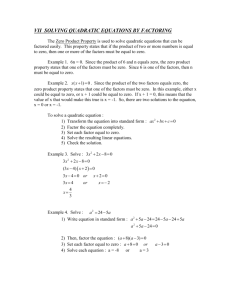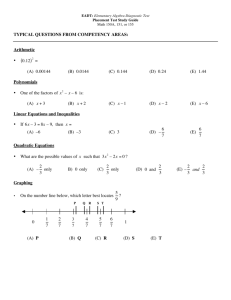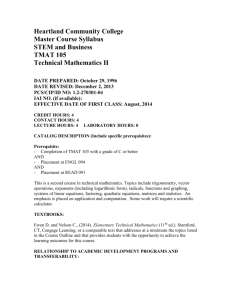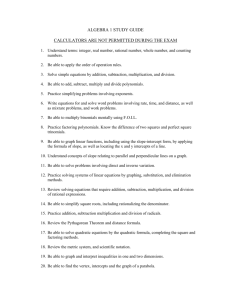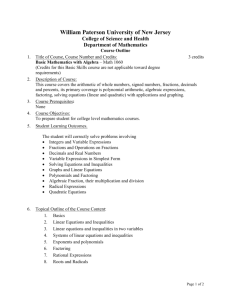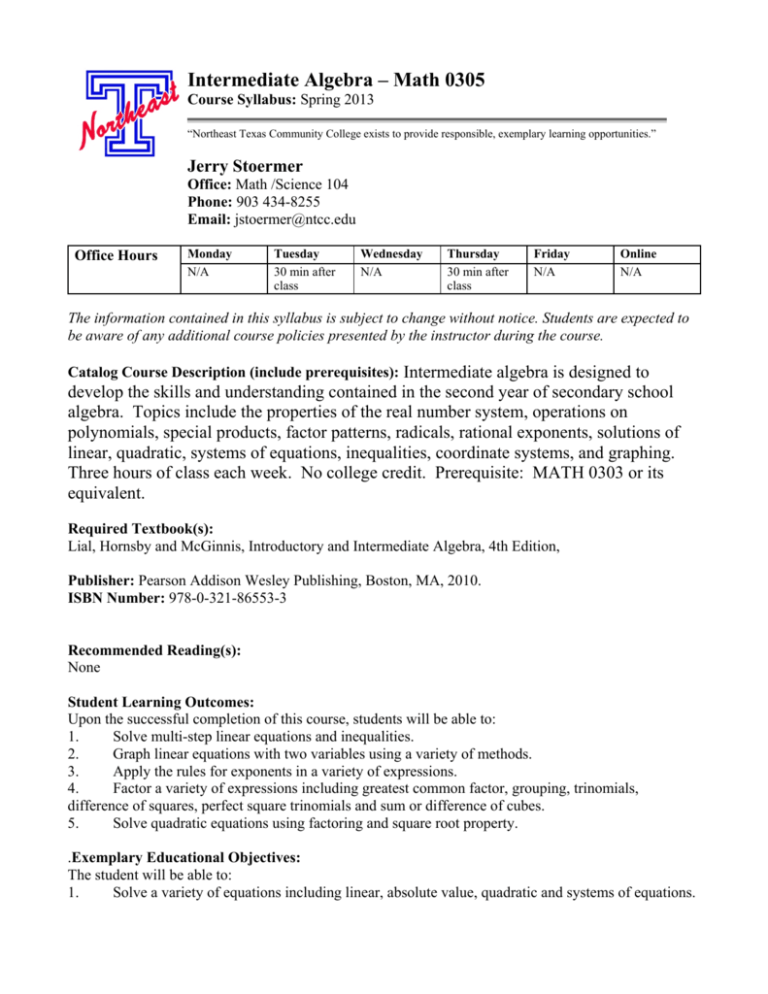
Intermediate Algebra – Math 0305
Course Syllabus: Spring 2013
“Northeast Texas Community College exists to provide responsible, exemplary learning opportunities.”
Jerry Stoermer
Office: Math /Science 104
Phone: 903 434-8255
Email: jstoermer@ntcc.edu
Office Hours
Monday
N/A
Tuesday
30 min after
class
Wednesday
N/A
Thursday
30 min after
class
Friday
N/A
Online
N/A
The information contained in this syllabus is subject to change without notice. Students are expected to
be aware of any additional course policies presented by the instructor during the course.
Catalog Course Description (include prerequisites): Intermediate algebra is designed to
develop the skills and understanding contained in the second year of secondary school
algebra. Topics include the properties of the real number system, operations on
polynomials, special products, factor patterns, radicals, rational exponents, solutions of
linear, quadratic, systems of equations, inequalities, coordinate systems, and graphing.
Three hours of class each week. No college credit. Prerequisite: MATH 0303 or its
equivalent.
Required Textbook(s):
Lial, Hornsby and McGinnis, Introductory and Intermediate Algebra, 4th Edition,
Publisher: Pearson Addison Wesley Publishing, Boston, MA, 2010.
ISBN Number: 978-0-321-86553-3
Recommended Reading(s):
None
Student Learning Outcomes:
Upon the successful completion of this course, students will be able to:
1.
Solve multi-step linear equations and inequalities.
2.
Graph linear equations with two variables using a variety of methods.
3.
Apply the rules for exponents in a variety of expressions.
4.
Factor a variety of expressions including greatest common factor, grouping, trinomials,
difference of squares, perfect square trinomials and sum or difference of cubes.
5.
Solve quadratic equations using factoring and square root property.
.Exemplary Educational Objectives:
The student will be able to:
1.
Solve a variety of equations including linear, absolute value, quadratic and systems of equations.
2.
Become functional with polynomial theory, definitions, properties, and operations including the
laws of exponents.
3.
Recognize various factor patterns from greatest common factor to factoring by grouping and
apply these to simplification and solution to various expressions and equations.
4.
Solve and graph linear equations.
5.
Solve systems of equations by graphing, substitution and elimination.
6.
Solve and graph quadratic equations.
7.
Find the equation of a line using slopes and/or intercepts.
8.
Extend the rules of arithmetic to rational algebraic expressions including operations, properties.
9.
Utilize the properties of exponents, roots, and radicals in simplifying radical expressions.
10.
Apply functional notation.
11.
Solve word problems involving one and two unknowns.
SCANS Skills:
N/A
Lectures & Discussions:
Lectures are interlaced with student practice. Cooperative learning is desired.
Evaluation/Grading Policy:
While this is a non-credit course, a traditional grading system will be used, and this grade will appear on
the student’s transcript. Successful completion of the course will require a final average of "C" or better.
Tests/Exams:
There will be four exams and a comprehensive final. Students are expected to take an exam when it is
scheduled. Should an emergency arise on the day of the exam, the student should notify the instructor as
soon as possible to make arrangements for a make-up exam. Late exams will be assessed a 20 to 50
point penalty. No exams may be taken after 2 weeks. If you fail either of the first two exams, they may
be re-taken once to achieve a passing score.
Homework will be assigned from the textbook every class period. It is due at the start of the next class
period. Homework later than 2 week will not be accepted. Quizzes will be given occasionally to help
reinforce learning and test taking skills. Quiz grades will be integrated with the homework assignment.
If you are absent for any reason, it is your responsibility to obtain the assignment and have them ready at
the next class period.
The Academic Skills Center has tutors available to help you with your math. If you want to be
successful in this class, it is absolutely essential that you do your homework. Working on the study plan
and taking the practice tests are essential. You will find that they will be very helpful in preparing for
the exams
GRADING SYSTEM
Homework
10 %
Attendance
10 %
Participation
10 %
Exams
40 %
Final Exam
30 %
put forth effort during the semester
A = 90 - 100
B = 80 - 89
C = 70 - 79
F = Below 70
NC = 60 - 69, but the student has
NOTE: Grading system subject to change if in the best interest of the class.
RE-TESTING POLICY
If THEA or Accuplacer is retaken before the student completes a developmental course, the resulting
score will determine placement in subsequent courses. It is the student’s responsibility to take the score
to the instructor of the class. That instructor will give the student a grade of CR on the final grade sheet,
and the student will no longer be required to attend that class for the rest of the semester
Assignments:
Review: Summary Exercises on Operations with Real Numbers, p. 89
Unit I: Equations, Applications and Inequalities
8.1.
Review of Solving Linear Equations and Inequalities
2.4
An Introduction to Applications of Linear Equations
8.3
Absolute Value Equations
Unit II: Graphs of Linear Equations; Functions
3.2
Graphing Linear Equations in Two Variables
3.3
Slope of a Line
3.4
Equations of Lines
3.5
Summary Exercises on Graphing Linear Equations, pages 283 – 284
3.6
Introduction to Functions
Sum Summary of 3.2 thru 3.4 problems, Quiz
Unit III: Systems of Linear Equations and Inequalities
4.1
Solving Systems of Linear Equations by Graphing
4.2
Solving Systems of Linear Equations by Substitution
4.3
Solving Systems of Linear Equations by Elimination
Unit IV: Exponents and Polynomials
5.1 to 5.4 Review as needed. Complete notes handout.
5.3
Multiplying Polynomials
5.4
Special Products
5.5
Integer Exponents and the Quotient Rule
5.6
Dividing a Polynomial by a Monomial
5.7
Dividing a polynomial by a Polynomial
5.8
An Application of Exponents: Scientific Notation
Unit V: Factoring and Applications
Review the following types of factoring problems: Greatest Common Factor, Trinomials with a firstterm coefficient of 1, Difference of Squares and Perfect Square Trinomials. Assign problems as
necessary.
6.1
Factoring –Greatest Common Factor
6.2
Factoring Trinomials (Diamond Method)
6.4
Factoring Trinomials w/ leading Coefficient
6.5
Special Factoring Techniques
6.6
A General Approach to Factoring
6.7
Solving Quadratic Equations by Factoring
Unit VI: Rational Expressions and Functions
7.1
Rational Expressions and Functions: Multiplying and Dividing
7.2
Adding and Subtracting Rational Expressions
7.3
Complex Fractions
Unit VII: Roots, Radicals and Root Functions
9.1
Radical Expressions and Graphs
9.2
Rational Exponents
9.3
Simplifying Radical Expressions and the Pythagorean Formula
Unit VIII: Quadratic Equations, Inequalities, and Functions
10.1. Solving Quadratic Equations by the Square Root Property
10.3 Solving Quadratic Equations by the Quadratic Formula
Other Course Requirements:
N/A
Student Responsibilities/Expectations:
Students are expected to conduct themselves in a mature and respectful manner toward the instructor as
well as other students. An orderly and cooperative classroom environment is essential for optimum
learning to take place. Students are expected to maintain honesty in all of their educational endeavors.
(See NTCC Student Handbook and college catalog.) Inappropriate behavior will result in loss of
participation points and/or dismissal from the class.
NTCC Academic Honesty Statement:
"Students are expected to complete course work in an honest manner, using their intellects and resources
designated as allowable by the course instructor. Students are responsible for addressing questions
about allowable resources with the course instructor. NTCC upholds the highest standards of academic
integrity. This course will follow the NTCC Academic Honesty policy stated in the Student Handbook."
Academic Ethics
The college expects all students to engage in academic pursuits in a manner that is beyond
reproach. Students are expected to maintain complete honesty and integrity in their academic
pursuit. Academic dishonesty such as cheating, plagiarism, and collusion is unacceptable and may
result in disciplinary action. Refer to the student handbook for more information on this subject.
ADA Statement:
It is the policy of NTCC to provide reasonable accommodations for qualified individuals who are
students with disabilities. This College will adhere to all applicable federal, state, and local laws,
regulations, and guidelines with respect to providing reasonable accommodations as required to afford
equal educational opportunity. It is the student’s responsibility to arrange an appointment with a
College counselor to obtain a Request for Accommodations form. For more information, please refer to
the NTCC Catalog or Student Handbook.
Family Educational Rights And Privacy Act (Ferpa):
The Family Educational Rights and Privacy Act (FERPA) is a federal law that protects the privacy of
student education records. The law applies to all schools that receive funds under an applicable program
of the U.S. Department of Education. FERPA gives parents certain rights with respect to their children’s
educational records. These rights transfer to the student when he or she attends a school beyond the high
school level. Students to whom the rights have transferred are considered “eligible students.” In essence,
a parent has no legal right to obtain information concerning the child’s college records without the
written consent of the student. In compliance with FERPA, information classified as “directory
information” may be released to the general public without the written consent of the student unless the
student makes a request in writing. Directory information is defined as: the student’s name, permanent
address and/or local address, telephone listing, dates of attendance, most recent previous education
institution attended, other information including major, field of study, degrees, awards received, and
participation in officially recognized activities/sports.
Other Course Policies:
Regular and punctual attendance at all scheduled classes is expected. Attendance is necessary for
successful completion of course work. If a student is absent, it is his/her responsibility for initiating
procedures for make-up work. Each absence lowers your attendance grade by 10 points. Each tardy
lowers your attendance grade by 5 points.
***IMPORTANT: Students who miss more than 7 classes and a test for any reason will receive an F for
the course. There are no “excused” absences for this course



